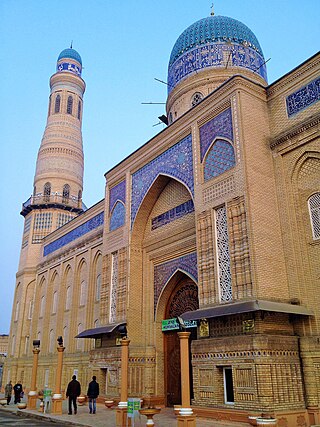Related Research Articles

Religious intolerance is intolerance of another's religious beliefs, practices, faith or lack thereof.
Freedom of religion in Algeria is regulated by the Algerian Constitution, which declares Islam to be the state religion but also declares that "freedom of creed and opinion is inviolable" ; it prohibits discrimination, Article 29 states "All citizens are equal before the law. No discrimination shall prevail because of birth, race, sex, opinion or any other personal or social condition or circumstance". In practice, the government generally respects this, with some limited exceptions.
Freedom of religion in Italy is guaranteed under the 1947 constitution of the Italian Republic. Before that religious toleration was provided for by the constitution of the Kingdom of Italy which in turn derived from the Albertine Statute granted by Carlo Alberto of the Kingdom of Sardinia to his subjects in 1848, the Year of Revolutions.
Freedom of religion in Colombia is enforced by the State and well tolerated in the Colombian culture. The Republic of Colombia has an area of 439,735 square miles and its population is estimated at 46 million.

Sunni Islam is the dominant religion in Jordan. Muslims make up about 97.2% of the country's population. A few of them are Shiites. Many Shia in Jordan are refugees from Syria, Lebanon, and Iraq.

The National Administrative Department of Statistics (DANE) does not collect religious statistics, and accurate reports are difficult to obtain. However, based on various studies and a survey, about 90% of the population adheres to Christianity, the majority of which (70.9%) are Roman Catholic, while a significant minority (16.7%) adhere to Protestantism and other Christian groups.

Christianity is the religion of 6% of the population of Djibouti. Christians are mostly of Ethiopian and European ancestry. Most Christians are Ethiopian Orthodox or Roman Catholic. The constitution of Djibouti includes freedom of religion, although Islam is the state religion. There is a tolerant attitude between religions in general. Proselytizing by any faith in public is not allowed.

Christianity is a minority religion in Yemen. The Yemeni constitution mentions religious liberty. There are three churches in Aden.

Christianity is a minority religion in Tajikistan.

Christianity is the largest religion in Uruguay, with Catholics having the most adherents, but around 44.5% of the population is non-religious as of 2021. Church and state are officially separated since 1916.
The Turkmen of Turkmenistan, are predominantly Muslims. According the U.S. Department of State's International Religious Freedom Report for 2022,
According to U.S. government estimates, the country is 93 percent Muslim, 6.4 percent Eastern Orthodox, and 0.6 percent other. There are small communities of Jehovah's Witnesses, Shia Muslims, Baha’is, Roman Catholics, the International Society for Krishna Consciousness, and evangelical Christians, including Baptists and Pentecostals. Most ethnic Russians and Armenians identify as Orthodox Christian and generally are members of the Russian Orthodox Church or Armenian Apostolic Church. Some ethnic Russians and Armenians are also members of smaller Protestant groups. There are small pockets of Shia Muslims, consisting largely of ethnic Iranians, Azeris, and Kurds, some located in Ashgabat, with others along the border with Iran and in the western city of Turkmenbashy.
According to U.S. government estimates, in 2022 Turkmenistan is 89% Muslim, 9% Eastern Orthodox Christian and 2% other religions. In 2023, the country was scored zero out of 4 for religious freedom; it was noted that restrictions have tightened since 2016. In the same year it was ranked the 26th worst place in the world to be a Christian.

Christians, most of whom are ethnic Russians, constitute less than 11% of the population in Turkmenistan; Eastern Orthodoxy in Turkmenistan is the main form of Christianity.

Christianity is the most widely professed religion in Zimbabwe, with Protestantism being its largest denomination.
Religion in Guinea-Bissau is diverse, with no particular religion comprising an absolute majority of the population. Islam is the most widely professed faith, and significant populations of Christians and adherents of traditional African religions are also present in the country.

Christianity is the largest religion in Cape Verde, with Roman Catholics having the most adherents. Different sources give varying estimates on the relative sizes of various Christian denominations. More than 94% of the population of Cape Verde is Christian, with almost 85% being Roman Catholic. About 5% of the population is Protestant. The largest Protestant denomination is the Church of the Nazarene. Other groups include the Church of the Nazarene, the Assemblies of God, Seventh-day Adventist Church, the Universal Church of the Kingdom of God, independent Baptists and various other Pentecostal and evangelical groups.

Christianity is the predominant religion in Solomon Islands, with Anglicanism being the single largest denomination.

Christianity is the largest religion in Nauru, with Nauru Congregational Church being the largest denomination, encompassing 35.71% of the population as of the 2011 census.

Christianity is the most widely professed religion in Croatia, representing 87.4% of the total population. A large majority of the Croats declare themselves to be members of the Catholic Church.

Islam is the predominant religion in Uzbekistan.
References
- ↑ The ARDA website, retrieved 2023-08-08
- ↑ Progress Law website, article dated May 16, 2023
- ↑ Voice of the Martyrs Canada website, retrieved 2023-08-08
- 1 2 US State Dept 2022 report
- ↑ World Watch Monitor website
- ↑ Vereinigte Evangelisch-Lutherische Kirche Deutschlands velkd.de
- ↑ The World Christian Encyclopedia, Second edition, Volume 1, p. 758